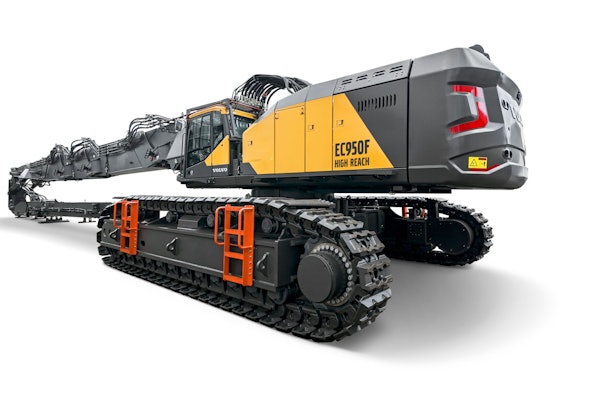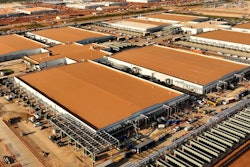Gradually more jobs are requiring some form of greenhouse-gas reduction from contractors, as companies strive to meet emissions goals.
Most of the focus has been on alternative-engine technology, such as compressed natural gas, electric, hydrogen.
But on this episode of The Dirt, we learn there’s an easier, quicker way to cut carbon-dioxide emissions, and all contractors have to do is change the fuel. No engine modifications are needed. Besides that, biodiesel and renewable diesel are actually better for your construction equipment’s engines, according to guest Troy Shoen, director of sales and marketing for Chevron Renewable Energy Group, one of the largest producers of biodiesel and renewable diesel in the U.S.
That’s because they both contain a solvent that cleans and acts as a lubricant. The fuels also achieve better combustion than traditional diesel.
Aside from all that, the alternative fuels help our nation’s farmers, adding 13% more value to their products, Shoen explains.
Along with the benefits, Shoen breaks down the difference between biodiesel and renewable diesel and how contractors can get started using the alternatives as soon as they want and in percentages as small as they want.
So to learn more about an emissions-reduction solution that is available here and now with no engine modifications, check out the latest episode of The Dirt.
Equipment World serves up weekly videos on the latest in construction equipment, work trucks and pickup trucks – everything contractors need to get their work done. Subscribe and visit us at equipmentworld.com!
In This Episode:
- 00:00 – Biodiesel and Renewable Diesel
- 00:34 – Helping American Farmers
- 04:00 – What’s the Importance of These Fuels?
- 05:19 – Biodiesel vs. Renewable Diesel
- 09:02 – Dyed Diesel vs. Biodiesel and Renewable Diesel
- 14:28 – Modifications Needed for Biodiesel and Renewable Diesel
- 16:14 – Why Biodiesel and Renewable Diesel May Become Necessary
- 18:55 – Final Thoughts
00:00:00:10 - 00:00:23:23
Bryan Furnace
Today we're here to talk about alternative fuels again. But not compressed natural gas or electric. We're talking about diesel. More specifically, we're talking about biodiesel and renewable diesel. What are these fuels and why aren't we talking more about them?
00:00:23:23 - 00:00:34:10
Bryan Furnace
And can we use them in any of our equipment here to give us more? Is Troy with Chevron?
00:00:34:12 - 00:00:41:16
Bryan Furnace
Can you start off the interview just giving us a bit of a background of how you got into your role and kind of where you came from?
00:00:41:18 - 00:01:00:12
Troy Shoen
Yeah, you bet. It's been an interesting journey. So I grew up in Iowa, in rural Iowa and around the agriculture industry in the 80s. So you look you look way too young, Brian, to spend much time in the 80s. But, so you may not be familiar, but the 80s were really tough in agriculture industry, so there was tough times for getting there.
00:01:00:12 - 00:01:17:06
Troy Shoen
Farmers foreclosed on, and it was a really difficult time in that industry. And that was the era and the time when I grew up. And so I saw my father have to auction off his equipment. And essentially, we lost our farm at that time. And that was very an impressionable for me. So that made a deep impact on me.
00:01:17:06 - 00:01:31:20
Troy Shoen
And, and I thought, you know what? Someday I want to help farmers that they don't have to go through what it was that our family had to go through. During that time, I didn't know what that look like or what that was going to be at the time, but I just knew I wanted to get back into a field that help that.
00:01:31:20 - 00:01:59:07
Troy Shoen
And so I went through some various jobs and then found myself back to a company called Renewable Energy Group, which was producing liquid biodiesel and renewable diesel, and they were using the products that farmers were growing or in some cases, the animals they were producing was using the byproducts from those to make these fuels. And I recognized that this was adding value back to farmers and said, oh yeah, that was where I wanted to head at some point in my career anyway.
00:01:59:07 - 00:02:21:02
Troy Shoen
And so it seemed like a really natural fit for me to to join the organization. And, you know what? What we do today is, is add actually 13% more value back to our nation's farmers as a result of this industry. So if the biodiesel renewable diesel industry didn't exist, farmers would have 13% less value in the products that they produce than they do today.
00:02:21:02 - 00:02:41:21
Troy Shoen
So so that's exciting to me. And this company, renewable energy Group, actually started out a really small cooperative in Ralston, Iowa. And what happened is farmers are bringing their soybeans to this farmers’ cooperative, and then they developed a crushing facility where they were actually crushing the soybeans there. And they were taking that meal and selling that and adding value to the products they were creating.
00:02:41:21 - 00:02:57:00
Troy Shoen
But they had this byproduct that was soybean oil, and they didn't know what they were going to do with the soybean oil. So, they started to package it in these little, tiny bottles and use it as grill cleaners. So people would buy these, and they they'd spray it on their grills and be able to clean their grills.
00:02:57:02 - 00:03:14:08
Troy Shoen
Because this product was a was a really great, solvent for doing that. But quickly they grew to the point where they couldn't package enough of it in these little bottles and realized they needed to do something else with the oil, and they decided to make biodiesel out of it. And that became really the start of the biodiesel industry.
00:03:14:08 - 00:03:34:19
Troy Shoen
So it was it was one of the leading starting moments of the biodiesel industry. And so renewable energy grew really quickly from there. So they started to produce similar biodiesel facilities for other farmers cooperatives around the country, and then went back and bought those over time, bought those biodiesel facilities, and grew into one of the nation's largest biodiesel producers.
00:03:34:21 - 00:03:52:19
Troy Shoen
Also during that time, they bought a renewable diesel plant down in Louisiana. And I think we'll get into a little bit the difference between biodiesel and renewable diesel. But at this point in the history of the organization, renewable Energy Group was the nation's largest producer of biodiesel, as well as one of the first in the nation producers of renewable diesel and all that.
00:03:52:22 - 00:03:59:13
Troy Shoen
Super exciting to me because again, I just want to add value back to our nation's farmers and feel like your products are doing that.
00:03:59:15 - 00:04:21:12
Bryan Furnace
So I guess my question is, you know, I think everyone kind of understands the conversation surrounding compressed natural gas or, electric, you know, battery driven vehicles. Why why are we now talking about bio diesel and renewable diesel? Is our is our current dyed diesel going to go away? What's what's the importance of this conversation.
00:04:21:14 - 00:04:45:13
Troy Shoen
Yeah. The importance of liquid renewable fuels is there's a lot of ways to meet different regulations or standards of people have to reduce carbon emissions, reduce carbon intensity, reduce GHG emissions and they can do that through technologies that you mentioned electrification, natural gas, propane. There's lots of options for people, but there's a very easy solution today. And that's biodiesel.
00:04:45:13 - 00:05:09:07
Troy Shoen
And renewable diesel because they're liquid fuels and there are absolutely no engine modifications that have to happen. There's no modifications to any of the fuel supply chain. The different tanks and terminals and all that. These products go right through those same systems into the engine. That is why I believe that these products are the best solution today for reducing carbon emissions and helping meet some of the goals that the companies have.
00:05:09:11 - 00:05:18:21
Troy Shoen
I don't think die diesel is going away. I just think these are products that help integrate very easily into the system to help meet some of those goals that, that, that folks have.
00:05:18:23 - 00:05:31:12
Bryan Furnace
So I hear you throwing around the term biodiesel, and I hear you throwing around the term renewable diesel. Is there a difference between the two? Is there an advantage of one over the other kind of what differentiates those?
00:05:31:14 - 00:05:53:04
Troy Shoen
Yeah, I think first I'll talk about the similarities and that is that both products are originated from the same exact agricultural products. So you're talking about used cooking oil. So this is cooking oil that you might be familiar with at a McDonald's in the back, where they're using the fry French fries in that used cooking oil is turned into biodiesel and renewable diesel.
00:05:53:06 - 00:06:14:00
Troy Shoen
We're talking about animal fats. So these are animal processing facilities that render the meat. And they have fat left over. They heat that fat into a liquid form, and we take that and turn it into a liquid fuel. We're talking about different distillers’ corn oil. So corn oils that come out as a byproduct of the ethanol industry. We take that and we make biodiesel, renewable diesel.
00:06:14:04 - 00:06:35:13
Troy Shoen
So the same products go into the process. Whether it's biodiesel, renewable diesel that you're making the biggest difference is during the actual processing of these two products. And so for biodiesel, it's a very simple process. You just take these various fats and oils, or we call them triglycerides. You mix it with methanol, which is a catalyst, and you get a methyl ester, which is biodiesel.
00:06:35:15 - 00:06:58:23
Troy Shoen
And that's the product that that goes into, fuel, vehicles across the country for renewable diesel. And then instead of using the methanol as a catalyst, they actually use, hydrogen. So it's a hydrogen-based process. And so it's a much more intense process. It requires, more heat, it requires more time. It requires much more sophistication to develop them than biodiesel.
00:06:58:23 - 00:07:22:19
Troy Shoen
But they all start with the same products on the on the front end. So what you get then for fuels are actually two different products. So for biodiesel you get a product that's oxygenated. And what that means is it just has different properties that have that renewable diesel. And because of that it has its own specification. So if you're familiar with ASTM specifications for fuel, biodiesel has its own ASTM specification.
00:07:22:19 - 00:07:46:02
Troy Shoen
That's different than diesel fuel. As a result of that, most people will blend biodiesel up to 20% with diesel fuel. So it's a product that in most cases, although you can use it at 100%, especially in mining operations, they're using biodiesel at 100%, but in most cases, it's blended at just a 20% inclusion rate with diesel fuel. On the other hand, renewable diesel has the same exact specification as diesel fuel.
00:07:46:04 - 00:08:13:23
Troy Shoen
So the D971 specification is the diesel fuel specification. It's also the same spec for renewable diesel. They're so similar to each other. So you can use 100% renewable diesel in an engine and get all the benefits of that decarbonization throughout your entire fuel. So that's kind of the biggest difference between those two products. I think the other thing to keep in mind is that because the renewable diesel process is more intensive to actually create the renewable diesel, it is more expensive as well.
00:08:14:01 - 00:08:34:11
Troy Shoen
So if you're looking at cost of fuels, a biodiesel is going to be, a cheaper product than renewable diesel. So what we found is a lot of people are actually blending the two products together. So they're taking renewable diesel at, say, an 80% or 50% inclusion rate. And then they'll take biodiesel at a 20% or 50% inclusion rate to blend these two products together.
00:08:34:13 - 00:08:42:13
Troy Shoen
And then this is the product that they'll use. So they get the 100% GHG reduction benefits of of those two products, but at a little bit cheaper price point.
00:08:42:19 - 00:08:57:06
Bryan Furnace
Interesting. So it sounds like the advantage of the biodiesel is, is the simplicity of the manufacturing. The advantage of the renewable diesel is the fact that it is a is a drop-in replacement for the diesel that we're currently using.
00:08:57:08 - 00:09:01:23
Troy Shoen
Yeah, that's a terrific synopsis of of how those two products differ from each other.
00:09:02:00 - 00:09:26:17
Bryan Furnace
So I guess my next question is now to bring the third, the third person to the party here. Do those have any advantages over the traditional diesel that we're using, not only from a performance standpoint, but just from an overall price or availability standpoint? Well, how does how do those compare?
00:10:08:08 - 00:10:31:14
Troy Shoen
Yeah, well, I'll start with the most obvious advantage, which is the reduction in GHG emissions out of the out of the tailpipe, and also the lower carbon intensity of these fuels versus traditional diesel fuels or diesel fuels folks might be used to. So so why is that important? Because I know a lot of people in, you know, the industries that are going to be watching will say, well, you know, I'm just trying to keep things going, right.
00:10:31:14 - 00:10:48:14
Troy Shoen
I just want something that's going to perform well. It's not going to cause major engine maintenance issues, and it's going to be priced reasonably. And I want to move on. Right. I don't care, I don't care about, GHG emissions and those, those types of things. So what I found is a lot of people are starting at that point, but things are changing.
00:10:48:15 - 00:11:21:11
Troy Shoen
They're changing rapidly. And I'll give you an example. I'm working with a construction company now that we're providing a blend of renewable diesel and biodiesel for use in their equipment, and the reason they're using it, they came to us to use this product is because they won an RFP with a large major company who was building data centers across the country, and this large major company had GHG reduction goals that they announced and provided to their shareholders, their stakeholders, to the media, to everyone, and said, hey, we're going to reduce emissions by this much percent by 2030.
00:11:21:11 - 00:11:41:03
Troy Shoen
And so they demanded that whoever got the RFP, whichever construction company won this RFP for their data centers, would be able to reduce GHG emissions on the construction project of the of the center. And so this construction company said the best way to do this is to start using renewable fuels instead of the traditional dyed diesel that we use today.
00:11:41:08 - 00:11:57:11
Troy Shoen
And so they turned to us to say, hey, can you supply this to us? So while it may be easier to say, oh, I don't really care about the environment, it's not something I pay attention to. At the end of the day, when it's a matter of whether you're winning, construction opportunities are losing them. You know, all of a sudden you need to look for a solution.
00:11:57:11 - 00:12:22:08
Troy Shoen
And again, your options are electrification, which is really, really expensive. And you're talking engine modifications, new equipment, all of the capital expense associated with that. Or simply go to your current field distributor you use today and say, hey, can you get me renewable diesel or biodiesel to use in my equipment? And most likely they already have it today and can provide it for you if, if they don't, they can easily get it.
00:12:22:08 - 00:12:50:07
Troy Shoen
So it's really readily available, kind of nationwide. So, so that's the first advantage. But then I want to talk about performance a little bit as well, because it goes beyond just the decarbonization and that the low GHG emissions from a performance standpoint, biodiesel being an oxygenated fuel has really good lubricating capabilities. So it has just a small inclusion of biodiesel can replace any lubrication additive you might be adding to the ultra-low sulfur diesel that's being used today.
00:12:50:08 - 00:13:07:10
Troy Shoen
I talked about, you know, how it was first bottled in these spray bottles that were used to clean grills, right? It gets all that grease and gunk out of the way and fuels just a little bit inclusion of that biodiesel. So that's a huge benefit of biodiesel. The other benefit of biodiesel is that it has higher CT values.
00:13:07:10 - 00:13:31:12
Troy Shoen
And so you're talking about better combustion in the engine with biodiesel again because it's an oxygenated fuel for renewable diesel. You get that great C as well. So you get really good combustion. Plus you get advantages of reduction of NOx particulate matter. Some of these other things. Why that's important is because most of you, I'm guessing, have had issues with your after-treatment systems or your DPS over the years.
00:13:31:14 - 00:13:59:01
Troy Shoen
It is some absolutely. Yeah, folks in the industry face when you have this clean up fuel as renewable diesel and biodiesel running through the engines, you're going to have less regions in those systems. When you reduce the number of regions, you're also reducing the amount of maintenance you have on those systems, because you just start running and you just start rejecting as much, and you also are getting good fuel efficiency or better fuel efficiency, because all of that is is running without having to do those regions.
00:13:59:01 - 00:14:07:08
Troy Shoen
So those are some positive performance benefits of these products beyond just the GHG reduction component, which is important, in and of itself.
00:14:07:10 - 00:14:25:05
Bryan Furnace
Absolutely. That's kind of ultimately, you heard me off at the pass there. That was going to be one of my questions is the impact on the after-treatment systems. And and yeah, if we can, anything we can do to lessen the headaches that we're dealing with in the field with these after treatment systems, is is a giant win.
00:14:25:05 - 00:14:44:17
Bryan Furnace
So that's really good to hear that. It's having that sort of an impact. So my final question for you is and you kind of have already answered it I believe. But I do want to just flush it out. Is there anything I need to do to my 1985 dozer or any other piece of equipment in my fleet to prepare for the introduction of biodiesel?
00:14:44:17 - 00:14:52:13
Bryan Furnace
Or is this something that I literally just go to the pump? You know, I replace whatever my fuel tank is with biodiesel and just fill it right up.
00:14:52:15 - 00:15:09:05
Troy Shoen
Yeah, it's literally that easy. So if, if you have access to biodiesel, with which I think most people across the country do have access to it, it's as simple as going to the fuel distributor and saying, hey, I would like to start incorporating biodiesel into my fuel because I want to help get some of these benefits that I heard Troy talk about.
00:15:09:05 - 00:15:29:07
Troy Shoen
So it's really as simple as that. You don't have to change anything in your engines or make any modifications. Again, biodiesel generally up to 20% inclusion rate with diesel fuel. So the fuel distributor should be able to do that blending for you at the fuel terminal rack and deliver that fuel to you. Some people I like to start with a 5% biodiesel inclusion rate just to try it out, right.
00:15:29:07 - 00:15:55:14
Troy Shoen
They don't want to jump right to 20%. They say they'll start at five and gradually work up. And and that works as well. And that's very easy for people people to utilize as well. And what I found is, you know, I'll go talk to people and I'll say, hey, you know, does anyone use biodiesel today? And no one in the room will raise their hand, and then I'll say, how many of you go and feel, you know, your truck at the local pilot travel center or the, you know, the local Love's Travel center, and people raise their hands.
00:15:55:14 - 00:16:12:03
Troy Shoen
Hey. Yeah. I'm traveling, I go there, I fill up, and I say, guess what? You're getting biodiesel. You know, a lot of these large truck stops, power centers that we go to today already have incorporated biodiesel into their fuel supply. So most of us are using it today without even knowing it. It's just that simple to use these products.
00:16:12:05 - 00:16:37:23
Bryan Furnace
This is fascinating. It is, it will be interesting to kind of circle back to to the outside pressures conversation. Our industry almost prides itself on the on how much we don't care about the greenhouse gases and the environment, but it is it is consistent that, you know, the treatment systems are a great testament to this. The industry will ultimately always cave to outside pressures.
00:16:38:05 - 00:17:00:05
Bryan Furnace
And I think that's what a lot of this is going to boil down to. It's not necessarily everyone just deciding up and tomorrow that we care about the roses and the daisies. It's more of jobs are going to start requiring this sort of a a change because overall the goal is reducing greenhouse gases, reducing those emissions. So very interesting.
00:17:00:05 - 00:17:02:07
Bryan Furnace
Thank you. Troy, I really appreciate this.
00:17:02:09 - 00:17:29:03
Troy Shoen
Yeah. You bet. And you hit it on the head. Is that, you know, people are expecting this. They're demanding it. And and we're seeing whether it be investors of organizations or whether it's protesters or it's people just listening to the news. They are demanding cleaner fuels. They're demanding solutions for companies to start looking towards. And so that's what's going to drive change within the industry, is that you're going to have to do it in order to get opportunities to continue to do what it is you love.
00:17:29:03 - 00:17:46:12
Troy Shoen
And that's an interesting point because it brings me back to where we started, which is the agriculture industry. And I've thought about this a lot and that, you know, to be a farmer, to be able to do what you want to do, you have to start looking at things like environmental sustainability, right? You have to put in things like ground cover during the winter.
00:17:46:12 - 00:18:06:13
Troy Shoen
And some of these other practices and things like that, to have the ability to continue to do what it is that you want to do. And I think about that and other industries like construction and mining and some of these other, industries, that work with dirt is that hey, you know what? You have got to start doing these things in order to have the ability to continue to operate the way you operate today.
00:18:06:15 - 00:18:27:21
Troy Shoen
And we've come to that point. It's an inflection point within our society where we're needing to look at these solutions. And again, I think biodiesel and renewable diesel are the best because they're the easiest. And and so instead of making major capital investments, making major changes to equipment, having to do anything drastic, you can simply start incorporating these into your operation tomorrow if you wanted to.
00:18:27:23 - 00:18:44:01
Bryan Furnace
That's exactly what I was just going to say. Of all of the things that we're being, that we're talking about in this alternative fuels conversation, this is the by far and away the lowest pain point ever is just switch fuels. Oh, okay. Well I can do that.
00:18:44:01 - 00:18:47:03
Troy Shoen
Yeah. Close that. Yeah.
00:18:47:05 - 00:18:49:21
Bryan Furnace
Yeah. So well thank you again Troy. This is great.
00:18:50:00 - 00:18:54:18
Troy Shoen
Yeah. Thank you, Bryan. Thanks for having me on. I really appreciate it. I appreciate the opportunity to talk to you.
00:18:54:20 - 00:19:10:07
Bryan Furnace
Well, thank you again for Troy coming on the show to take the time to explain these renewable fuels to us and kind of break it down and give us an idea of what to expect and how well it will incorporate into our current fleet. As always, I hope this helps you and your business. We'll catch you on the next episode of The Dirt.








